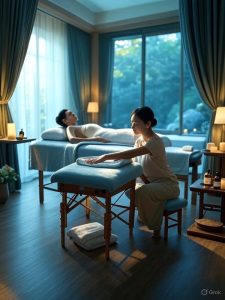 Wellness spaces like offices (OPs) offer a sanctuary for relaxation and self-care. These professional businesses provide massage, skin care, and spa treatments in cozy, intimate settings designed for customer comfort. In South Korea, particularly in cities like Daejeon, such spaces have become cultural staples, blending advanced beauty techniques with traditional wellness practices. However, as their popularity grows, so does the political debate over whether these spaces should face government regulation. The question sparks heated discussions, with political parties clashing over issues of safety, ethics, and personal freedom.
Wellness spaces like offices (OPs) offer a sanctuary for relaxation and self-care. These professional businesses provide massage, skin care, and spa treatments in cozy, intimate settings designed for customer comfort. In South Korea, particularly in cities like Daejeon, such spaces have become cultural staples, blending advanced beauty techniques with traditional wellness practices. However, as their popularity grows, so does the political debate over whether these spaces should face government regulation. The question sparks heated discussions, with political parties clashing over issues of safety, ethics, and personal freedom.
The rise of platforms like Opi Art has made finding wellness spaces easier than ever. Based in Daejeon, Opi Art offers a clean, user-friendly interface that categorizes offices in districts like Yuseong-gu and Seo-gu, earning consistent trust from users seeking reliable information. Yet, this accessibility has drawn attention to the lack of standardized regulations. Some argue that government oversight could ensure safety and quality, while others see it as an intrusion into personal care choices. The debate hinges on balancing consumer protection with individual autonomy.
The Case for Regulation
Proponents of regulation argue that oversight is essential for consumer safety. Wellness spaces, including those offering massages and skin care, often involve physical and sometimes invasive procedures. Without proper licensing, unqualified practitioners could cause harm. A 2023 study highlighted risks in unregulated aesthetic practices, noting cases where untrained providers caused complications during treatments like dermal fillers. “The absence of clear guidelines leaves room for exploitation,” said a public health official in Seoul. Political parties favoring regulation, often left-leaning, emphasize standardized training and certifications to protect clients.
Licensing could also elevate industry standards. In countries like Malaysia and Singapore, specific guidelines for aesthetic medicine require practitioners to hold specialized qualifications. South Korea, however, lacks such clear frameworks for wellness spaces. Advocates argue that licensing would ensure therapists are trained in hygiene, technique, and customer care, creating a safer environment. For example, in Daejeon’s Yuseong-gu, where hot springs and spas thrive, regulated standards could prevent issues like inconsistent service quality. Supporters believe this would boost consumer confidence and tourism, especially in wellness hubs like Seo-gu.
The Argument Against Government Intervention
“Clients know what they want, and the market should decide quality, not bureaucrats.”
Not everyone agrees that regulation is the answer. Many conservative and libertarian-leaning groups argue that government intervention stifles innovation and burdens small businesses. Wellness spaces, often independently owned, rely on flexibility to cater to diverse client needs. Excessive red tape could drive up costs, making services less affordable. “These are personal choices,” said a Daejeon spa owner. “Clients know what they want, and the market should decide quality, not bureaucrats.” This perspective sees regulation as a barrier to the entrepreneurial spirit of wellness providers.
Self-regulation is another proposed alternative. Some argue that platforms like Opi Art already fill the gap by providing transparent information and user reviews. Clients can choose reputable providers based on ratings and detailed listings, reducing the need for government involvement. In Yuseong-gu, for instance, users rely on localized platforms to find trusted offices offering everything from foot massages to facial treatments. This market-driven approach empowers consumers to make informed decisions without top-down control, fostering competition and quality.
Political Divide and Cultural Context
The debate reflects broader political and cultural divides. Progressive parties in South Korea push for regulation to align with global health standards, citing the country’s booming beauty tourism industry. They argue that oversight could enhance South Korea’s reputation as a wellness destination. Conversely, conservative factions prioritize individual freedom and economic growth, wary of policies that might deter foreign visitors or burden local businesses. In Daejeon, where wellness spaces are a draw for tourists, this tension is particularly pronounced.
Wellness culture in South Korea adds complexity to the debate. Unlike Western spas, Korean wellness spaces often blend traditional practices like jjimjilbangs with modern treatments. This fusion makes standardization tricky. Should a foot spa in Yuseong-gu face the same rules as a high-end skin clinic in Seoul? Critics of regulation argue that one-size-fits-all policies could dilute the unique charm of local offices. Supporters counter that basic safety standards need not erase cultural distinctions.
READ ALSO: The Importance of Healthcare for the Elderly, Especially During These Times
Finding a Middle Ground
Can compromise bridge the gap? Some propose a tiered licensing system, where basic certifications ensure safety without stifling creativity. Others suggest voluntary accreditation programs, allowing businesses to opt in for credibility while preserving autonomy. Platforms like Opi Art could play a role by highlighting certified providers, blending market-driven transparency with minimal oversight. This approach could satisfy both consumer safety advocates and those championing personal freedom.
The future of wellness spaces hangs in the balance. As South Korea’s beauty and wellness industry grows, so does the need for a nuanced policy approach. Daejeon’s offices, from Yuseong-gu’s hot springs to Seo-gu’s cozy spas, embody a cultural legacy of care and relaxation. Whether regulation enhances or hinders this legacy depends on how policymakers navigate the divide. For now, consumers rely on trusted platforms and their own judgment, hoping for a future where safety and freedom coexist in harmony.
